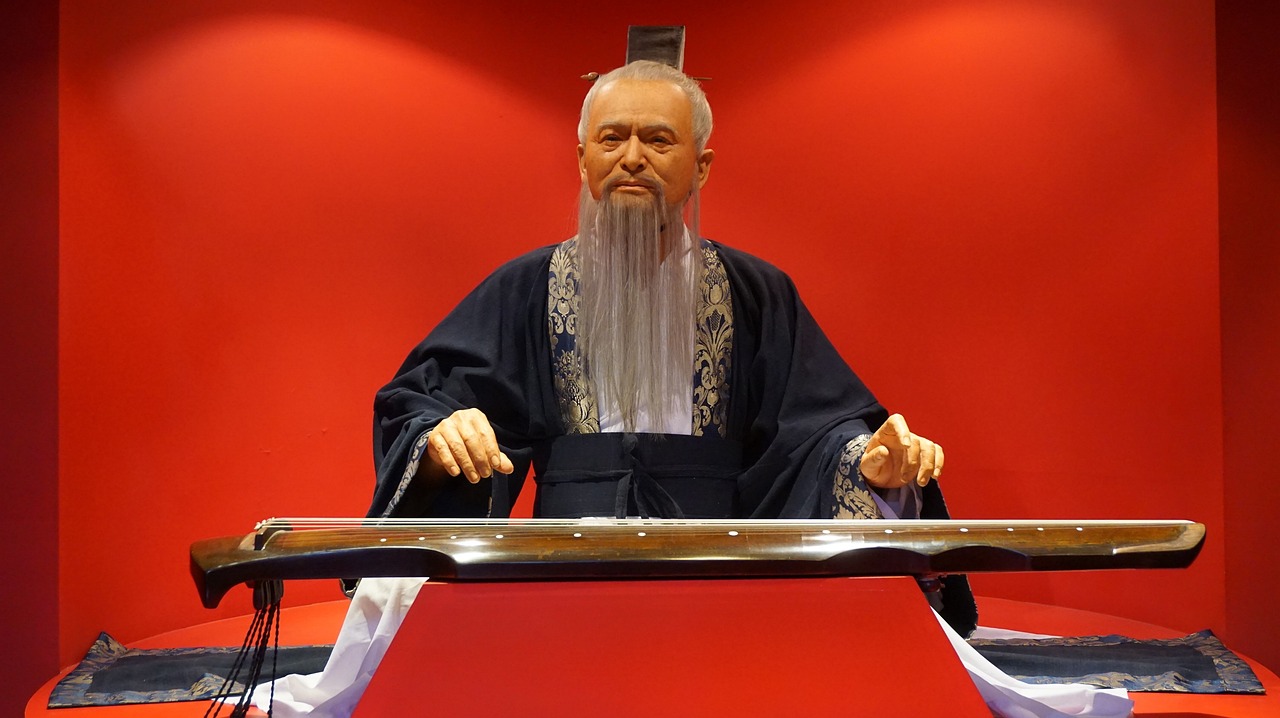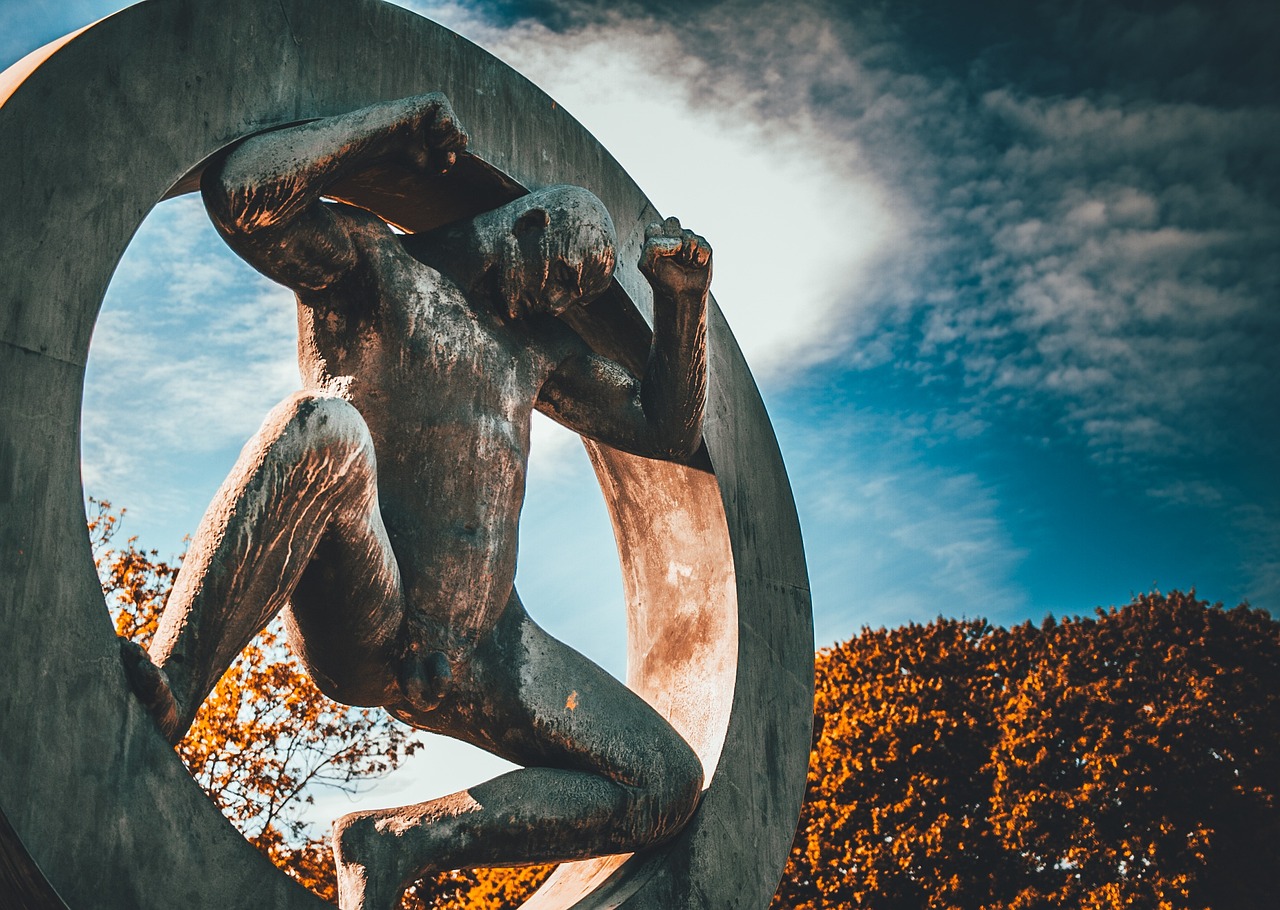The Life and Influence of Confucius
Confucius, also known as Kong Qiu, was a revered Chinese philosopher whose profound teachings have left an indelible mark on Chinese culture, ethics, and governance for centuries. Born in 551 BC in the state of Lu (present-day Shandong province), Confucius dedicated his life to the pursuit of wisdom and moral rectitude, seeking to bring harmony and order to a tumultuous world. His influence transcends time and borders, shaping the very fabric of society and human relationships.
From a young age, Confucius displayed a thirst for knowledge and a deep sense of duty towards his fellow beings. His education, steeped in the traditions of ancient China, instilled in him a strong moral compass and a fervent belief in the power of education to transform individuals and society. These formative years laid the foundation for his later teachings on the importance of virtue, righteousness, and social harmony.
Central to Confucius's philosophy is the concept of ren, often translated as "benevolence" or "humanity," which underscores the importance of empathy, compassion, and moral integrity in all human interactions. He emphasized the value of filial piety, respect for elders, and the cultivation of personal virtues as essential elements for a harmonious society.
Confucius's teachings also delved into the realm of governance and leadership, advocating for a meritocratic system based on moral character and ethical conduct. His emphasis on the rectification of names and the proper conduct of rituals aimed at fostering social order and moral discipline within a community.
The enduring legacy of Confucius's teachings extends far beyond the borders of China, influencing not only East Asian societies but also global perceptions of ethics, education, and social harmony. His emphasis on the cultivation of moral character and the pursuit of knowledge continues to resonate in modern society, offering timeless insights into the complexities of human nature and the quest for a just and harmonious world.
In the modern context, Confucian principles find application in various spheres of life, from education and business practices to governance and social relationships. The enduring relevance of his teachings underscores the universal appeal of moral values and ethical conduct in navigating the complexities of contemporary society.
Contrasted with other philosophical traditions such as Daoism and Legalism, Confucianism stands out for its emphasis on moral cultivation, social harmony, and the pursuit of virtue as the cornerstone of a well-ordered society. While each tradition offers unique insights into the human experience, Confucius's teachings continue to inspire and guide individuals in their quest for personal and societal fulfillment.
Despite his enduring legacy, Confucius's teachings have not been without controversy and criticism. Some have raised concerns about gender inequality, authoritarianism, and the challenges of adapting his ideas to the modern world. However, ongoing debates and reinterpretations of his teachings reflect a dynamic engagement with his philosophy and its relevance to contemporary issues.
In recent years, there has been a resurgence of interest in Confucianism, both in China and globally, as scholars and thinkers revisit his teachings for insights into ethics, governance, and societal harmony. This revival speaks to the enduring relevance of his ideas and their potential to offer guidance in navigating the complexities of the modern world.

Early Life and Education
Confucius, whose birth name was Kong Qiu, was born in 551 BCE in the state of Lu, located in present-day Shandong province, China. Growing up in a period of political turmoil and social unrest, Confucius experienced the chaos and disarray that plagued his homeland. Despite his humble beginnings, he displayed a thirst for knowledge and a deep sense of curiosity from a young age, setting the stage for his future intellectual pursuits.
During his formative years, Confucius immersed himself in the study of ancient texts and traditional rituals, seeking to understand the underlying principles that governed human behavior and societal order. His early education emphasized the importance of moral values, personal integrity, and the cultivation of virtue as essential components of a harmonious society. These foundational teachings would later become the cornerstone of his philosophical system.
As Confucius matured, he embarked on a journey of self-discovery and intellectual exploration, traveling to various states in China to engage with scholars, officials, and thinkers of his time. Through these encounters, he deepened his understanding of politics, ethics, and social relationships, refining his philosophical insights and shaping his vision for a more just and equitable society.
Despite facing setbacks and challenges along the way, including periods of exile and political marginalization, Confucius remained steadfast in his commitment to promoting moral values, social harmony, and ethical leadership. His dedication to education, self-improvement, and the pursuit of wisdom served as a guiding light for future generations seeking to uphold the principles of Confucianism.

Philosophy and Teachings
Confucius's philosophy and teachings delve deep into the fundamental principles that govern human relationships, ethics, and societal order. At the core of his teachings is the concept of filial piety, emphasizing the importance of respect for one's parents and ancestors. This concept forms the foundation of Confucian ethics, highlighting the significance of family harmony and the role of individuals in upholding familial obligations.
Another key aspect of Confucius's philosophy is the notion of righteousness, which encompasses moral integrity, honesty, and the pursuit of virtuous behavior. Confucius believed that individuals should cultivate their moral character through self-discipline and adherence to ethical principles, ultimately contributing to a just and harmonious society.
Central to Confucian teachings is the emphasis on the importance of rituals in fostering social cohesion and order. Rituals, according to Confucius, serve as a means of expressing respect, gratitude, and reverence, reinforcing the hierarchical relationships within society and promoting a sense of unity among individuals.
Confucius also stressed the significance of education as a transformative tool for cultivating moral virtues and nurturing individuals to become ethical leaders. Education, in the Confucian context, extends beyond academic knowledge to encompass moral development, character building, and the cultivation of wisdom through lifelong learning.
Overall, Confucius's philosophy and teachings advocate for the cultivation of personal virtues, the practice of ethical behavior, and the promotion of social harmony through the observance of moral principles and the fulfillment of one's societal roles.

Political Influence
Confucius's political influence extends far beyond his time, shaping the governance systems of East Asia and leaving a lasting impact on political thought worldwide. His emphasis on ethical leadership, meritocracy, and the cultivation of virtuous rulers has influenced political practices in China and beyond for centuries. Confucian principles promote the idea that leaders should govern with benevolence, wisdom, and integrity, prioritizing the well-being of the people and the stability of society.
Confucius believed in the importance of moral cultivation for both rulers and subjects, emphasizing the role of rituals and propriety in maintaining social order and harmony. His teachings on governance emphasized the need for leaders to lead by example, embodying the virtues of sincerity, righteousness, and filial piety. This emphasis on ethical leadership continues to resonate in political discourse, with leaders and policymakers drawing inspiration from Confucian ideals of good governance and social harmony.
One of Confucius's key contributions to political thought was his advocacy for meritocracy, the idea that individuals should be appointed to positions of power based on their moral character, abilities, and merit rather than hereditary privilege. This concept has had a profound impact on political systems in East Asia, where civil service examinations based on Confucian teachings were used to select government officials based on their knowledge and virtue.
Confucius's emphasis on the importance of education and moral cultivation in governance has also influenced modern political systems, with leaders recognizing the value of ethical leadership and the cultivation of virtuous individuals in positions of power. His teachings continue to shape discussions on political ethics, leadership qualities, and the role of government in promoting the well-being of society.

Legacy and Global Impact
Confucius, often referred to as the "Great Sage," left a profound legacy that continues to shape Chinese society and global cultural values to this day. His teachings on education, ethics, and social relationships have had a lasting impact on generations, emphasizing the importance of moral values and societal harmony.
One of Confucius's key contributions lies in his emphasis on the concept of filial piety, which stresses the importance of respect for one's parents and ancestors. This principle has been deeply ingrained in Chinese culture, influencing family dynamics and social interactions for centuries.
Moreover, Confucius advocated for the cultivation of personal virtues such as benevolence, righteousness, and propriety, which are essential for maintaining social order and harmony. His teachings on the importance of rituals and etiquette in fostering respectful relationships have had a profound influence on Chinese ethics and social norms.
Confucius's legacy extends beyond China, with his teachings gaining recognition and respect worldwide. His emphasis on ethical leadership, meritocracy, and the importance of education has resonated with people across different cultures, inspiring discussions on governance, ethics, and societal values.
Furthermore, Confucius's influence can be seen in various aspects of modern Chinese society, from education systems that prioritize moral development to business practices that emphasize ethical conduct and social responsibility. His teachings continue to serve as a moral compass for individuals and institutions seeking guidance in an increasingly complex world.
As globalization continues to connect diverse cultures and societies, the enduring legacy of Confucius serves as a bridge between the past and the present, offering valuable insights into the timeless principles of virtue, harmony, and social responsibility.

Confucianism in Modern Context
Confucianism, the ancient philosophical tradition stemming from the teachings of Confucius, continues to hold relevance in modern society, shaping various aspects of contemporary life. In today's context, Confucian principles are not only studied academically but also applied practically in different fields, including education, business practices, and governance. The emphasis on ethical behavior, respect for authority, and the importance of social harmony inherent in Confucianism resonates with many individuals seeking guidance in navigating the complexities of the modern world.
One key area where Confucian values are prominently manifested is in the realm of education. The focus on the cultivation of moral character, respect for teachers, and the pursuit of knowledge aligns with the goals of many educational institutions worldwide. By promoting a holistic approach to learning that emphasizes not only academic excellence but also moral development, Confucianism continues to influence educational practices and policies globally.
In the business world, the ethical principles advocated by Confucius, such as honesty, integrity, and loyalty, serve as a moral compass for decision-making and professional conduct. Companies that integrate Confucian values into their organizational culture often prioritize long-term relationships, mutual trust, and social responsibility, fostering a harmonious work environment and sustainable business practices.
Furthermore, in the realm of governance, the emphasis on benevolent leadership, meritocracy, and the welfare of the people espoused by Confucianism offers valuable insights for contemporary political systems. By promoting ethical leadership, social stability, and the common good, Confucian ideals contribute to the development of just and effective governance structures that prioritize the well-being of society as a whole.
Despite the challenges of modernization and globalization, Confucianism continues to play a significant role in shaping moral values and social norms in various societies. By adapting its teachings to address contemporary issues and concerns, individuals and institutions can draw upon the wisdom of Confucius to foster a more ethical, harmonious, and sustainable world.

Comparison with Other Philosophies
When comparing Confucianism with other philosophical traditions like Daoism and Legalism, it becomes evident that each school of thought offers unique perspectives on ethics, governance, and societal order. Confucius emphasized the importance of moral cultivation, social harmony, and the cultivation of virtues such as filial piety and righteousness. In contrast, Daoism focuses on living in harmony with the natural order, embracing spontaneity, and seeking inner peace through simplicity and detachment from worldly desires. Legalism, on the other hand, advocates for strict laws, centralized authority, and the use of rewards and punishments to maintain social order.
While Confucianism prioritizes ethical behavior and the cultivation of moral character as the foundation of a stable society, Daoism promotes a more individualistic approach to life, emphasizing personal cultivation and alignment with the Dao, or the way of nature. Legalism, in contrast, emphasizes the need for a strong central authority to enforce laws and maintain order, with a focus on practical governance rather than moral principles.
Confucianism's emphasis on social hierarchy, respect for authority, and adherence to rituals can be seen as contrasting with the more fluid and spontaneous nature of Daoist teachings. Legalism's focus on strict laws and the use of harsh punishments to deter wrongdoing also diverges from Confucian ideals of moral self-cultivation and virtuous leadership.
Despite these differences, each philosophical tradition offers valuable insights into the complexities of human nature, societal organization, and governance. By comparing and contrasting these diverse perspectives, we can gain a deeper understanding of the rich tapestry of ancient Chinese thought and the enduring legacy of Confucius's teachings in shaping moral values and social norms.

Controversies and Criticisms
Controversies and criticisms have long surrounded the teachings of Confucius, raising debates and discussions about the applicability and relevance of his ideas in the modern world. One of the primary criticisms leveled against Confucius is the issue of gender inequality inherent in his philosophy. Critics argue that his emphasis on hierarchical relationships and the subordination of women to men perpetuates patriarchal norms and restricts the rights and freedoms of women.
Furthermore, some critics point to Confucius's advocacy for authoritarian governance and strict adherence to rituals as potential obstacles to progress and individual liberty. The hierarchical structure promoted by Confucius, with its emphasis on respect for authority and social order, has been viewed as stifling creativity and innovation, hindering societal development and adaptability.
Another area of contention revolves around the challenges of applying Confucian principles in a rapidly changing and diverse world. Critics argue that the rigid moral codes and traditional values espoused by Confucius may not adequately address the complexities of modern society, where cultural diversity, globalization, and technological advancements present new ethical dilemmas and social dynamics.
Despite these criticisms, proponents of Confucianism argue that his teachings offer valuable insights into fostering social harmony, ethical leadership, and moral development. They contend that while some aspects of Confucianism may need reevaluation and adaptation, the fundamental principles of respect, benevolence, and righteousness remain relevant in promoting a more just and compassionate society.

Revival and Reinterpretation
Confucianism, once considered an ancient philosophy, is experiencing a remarkable revival in the contemporary world. Scholars and thinkers are delving back into the teachings of Confucius, seeking insights into ethics, governance, and societal harmony. This renewed interest is not limited to China alone but has spread globally, sparking discussions on the relevance of Confucian principles in today's complex and interconnected world.
As the world grapples with ethical dilemmas, political unrest, and social discord, many are turning to the timeless wisdom of Confucius for guidance. His emphasis on virtue, respect, and harmony resonates with individuals seeking a moral compass in a rapidly changing society. The reinterpretation of Confucian teachings in light of modern challenges offers a fresh perspective on addressing contemporary issues while staying rooted in traditional values.
In China, the resurgence of Confucianism is evident in various aspects of society, from education to governance. Schools are incorporating Confucian values into their curriculum, aiming to instill a sense of morality and social responsibility in the younger generation. Additionally, policymakers are revisiting Confucian principles to promote ethical leadership and harmonious coexistence among diverse communities.
Internationally, the reevaluation of Confucianism is fostering cross-cultural dialogues and interdisciplinary studies that explore the applicability of Confucian ethics in a globalized world. By adapting Confucian teachings to contemporary contexts, scholars are uncovering valuable insights that can contribute to intercultural understanding and peaceful coexistence
Frequently Asked Questions
- What are the core principles of Confucianism?
Confucianism emphasizes the importance of moral values, filial piety, righteousness, and the cultivation of personal virtues to create a harmonious society.
- How did Confucius influence Chinese culture and governance?
Confucius's teachings on ethical leadership, meritocracy, and social harmony have had a profound impact on Chinese culture, ethics, and governance for centuries.
- What is the modern relevance of Confucianism?
Confucian principles are still applied in contemporary society, influencing education, business practices, and governance, and shaping moral values and social norms.
- How does Confucianism differ from other philosophical traditions?
Confucianism is distinct from Daoism and Legalism in its emphasis on social harmony, moral cultivation, and the importance of rituals in fostering a well-ordered society.
- What are some criticisms of Confucius's teachings?
Critics have raised concerns about gender inequality, authoritarianism, and the challenges of adapting Confucian ideas to modern societal contexts.



















